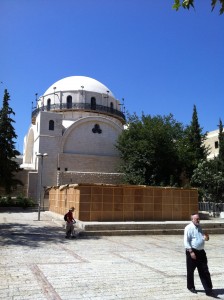I’ve been working for some time on a lengthy post about Succos, though it’s been hard to find the time to finish it. Then, the other day, a technical snafu erased my evening’s work. I’ll get around to finishing it, but I’m a bit demoralized.
In the meantime, I wanted to share something that happened here over Shabbos. It seems that an elderly gentleman (92 or 93) was davening (praying) at the vasikin minyan (morning service that starts before sunrise) this morning at the Churva, when he passed away. They cleared the building, canceled the remaining services for the day (there are many other options here in the Rova, obviously), and set up a succession of shomrim so that someone would be there with him in the synagogue constantly.
The reason they did this was that, under Jewish law, on Shabbos, a dead body falls into the category of muktzeh, which cannot be moved until after Shabbos. There is an exception for kavod hameis — the honor of the dead — if the body were to be somewhere disgraceful to it. But, here,kavod mameis certainly was for him to remain in the synagogue. So, there he remained.
One of the things that struck me when I heard the account this afternoon was everyone’s attitude. No one was horrified by the circumstances, or bemoaned the inconvenience, etc. Instead, everyone remarked on the Divine chesed (kindness) in (a) allowing this man’s last words to be the tefillos (prayers) of Shabbos kodesh (the holy Sabbath); and (b) having him pass away in the Churva — which is not only a magnificent and holy place, but is also well-air-conditioned — instead of (alone?) in his own, non-air-conditioned apartment. It also gave the community the opportunity to give an extra measure of kavod (honor) by freely turning over the Churva for this use.
A situation that could have been macabre instead was an amazing example of the values and dignity of the community. Mi k’amcha Yisrael…

